As the country prepares to vote on a final draft Constitution, which was released publicly on 29 March, includes clauses mandating a fully appointed Senate, seats reserved for senior military officers and enabling the appointment of an unelected prime minister. The charter gives the military broad control over administrative affairs even after an elected government is installed.
The draft also recommends that the junta-run National Council for Peace and Order (NCPO) will maintain absolute power until a new cabinet is formed and can intervene at any time to re-assume total power.
The draft charter, written by the Constitution Drafting Committee chaired by Meechai Ruchupan, is scheduled to go to a public referendum on Aug 7.
Since the Thai constitution drafting committee completed the draft charter, the authorities have intensified their campaign to suppress the human right to freedom of expression. The law governing the rules for the referendum, which was approved by the current military-appointed legislature on 7 April, mandates up to 10 years imprisonment for anyone convicted of disseminating false information to influence voters or otherwise disrupt the referendum.
Article 61 of the Referendum Act imposes a prison term of up to 10 years, a fine of up to 200,000 baht and loss of electoral rights for five years on anyone who publishes or distributes content about the draft constitution which deviates from the facts, contains rude and violent language, or threateningly discourages voters from participating in the referendum.
Repression and Intimidation
Article 61 of the Referendum Act imposes a prison term of up to 10 years, a fine of up to 200,000 baht and loss of electoral rights for five years on anyone who publishes or distributes content about the draft constitution which deviates from the facts, contains rude and violent language, or threateningly discourages voters from participating in the referendum.
Repression and Intimidation
On 30 March 2016, the Pheu Thai Party issued a statement condemning the final draft of the constitution and urging people to turn it down in the referendum, scheduled in August. The junta threatened the Pheu Thai Party if the statement misleads the public.
On 2 April 2016, the Thai military ordered ban a seminar on the controversial draft constitution in the northern province of Chiang Mai as the public referendum on the draft is drawing near.
On 2 Apr 2016, military and police officers searched the offices of Pheu Thai party politicians in northern Thailand and confiscated red bowls inscribed with Thai new year greetings from former Prime Minister Thaksin Shinawatra.
Earlier, military officers in Chiang Mai arrested Theerawan Charoensuk, 57, for posting on Facebook a picture of herself holding the red bowl with the Songkran message from Thaksin.
The military filed a charge against Theerawan under Article 116 of the Criminal Code, the sedition law, for posting the picture. Later, the Military Court of Chiang Mai released her on bail of 100,000 baht, about 2800 USD, pending a military trail. If found guilty, she could face up to seven years in prison.
On 13 April 2016, a dozen soldiers in four vehicles arrived at the home of Pheu Thai politician and former MP Watana Muengsuk who had publicly stated concern about Worachai’s welfare and the right to campaign against the draft charter before the referendum.
On 18 April 2016, Thai Junta ordered a politician of Phue Thai Party and former MP Watana Muangsook to report to the 11th Military Circle camp in Bangkok. He was detained at the 9th Infantry Division in Kanchanaburi province near Burmese border over a statement he posted on a social networking site against the draft Constitution. He was freed after 3 days detention.
On 18 April 2016, Thai Junta ordered a politician of Phue Thai Party and former MP Watana Muangsook to report to the 11th Military Circle camp in Bangkok. He was detained at the 9th Infantry Division in Kanchanaburi province near Burmese border over a statement he posted on a social networking site against the draft Constitution. He was freed after 3 days detention.
This is the third time that Watana Muangsook has been held in military detention without charge or trial since 2 March on the basis of his peaceful exercise of the right to freedom of expression.
On 21 April 2016, Watana Muangsook, a former Member of Parliament from Pheu Thai Party complaint that certain people pressured the Charoen Pokphand Company (CP), one of the biggest conglomerates in Asia run by the family of his former wife, to convince Weerada Muangsook, his daughter, to leave the country.
On 22 April 2016, soldiers in the northeastern (Isan) province of Udon Thani are intimidating anti-mine activists ahead of a planned forum on the environmental effects of a potash mine.
On 22 April 2016, the military has summoned the leader of an embattled indigenous seafarer community in the southern province of Phuket for a discussion, accusing him of violating a junta order. He was intimidated by the military
On 24 April 2016, the military indicted six activists for demanding an investigation into the Rajabhakti Park corruption scandal. Those indicted are reported to be Sirawit Serithiwat, a student activist from New Democracy Movement, Anon Nampa, a human rights lawyer and core leader of Resistant Citizen, Kititach Suman, Wisarut Anupoonkarn, Koranok Kamda and Wijit Hanhaboon for violating the junta’s political gathering ban.
25 April 2016, Gen Prawit Wongsuwan, the deputy junta head and Defence Minister, told the media that no one is allowed to criticise the junta-sponsored draft constitution publicly as the Draft Referendum Act is already in force.
The deputy junta head ordered the authorities to launch investigations into the People’s Democratic Reform Committee (PDRC) and the anti-establishment red shirts for announcing their stands on the draft constitution.
On 25 April 2016, the junta has threatened Bencharat Sae Chua, a lecturer of Mahidol University’s Institute of Human Rights and Peace Studies. The lecturer is distributing information for a vote against the military’s draft charter has been threatened with Section 61 of the Referendum Act of 2016. This could mean up to 10 years in jail.
On 27 April 2016, Thai military government cited power under Section 44 of the Interim Charter to arrest 10 Facebook users for their online messages criticising the Junta leader and the regime. The military officers detained them at the 11th Military circle. The eight have been charged with inciting public unrest under the Criminal Code's Section 116. They can face up to 10 years in prison and a fine of 200,000 baht.
On 27 April 2016, an election commissioner filed a complaint under the Draft Referendum Act against a fundraising organization in northeastern province of Khon Kaen. She was charged under Article 61 of the Referendum Act, where the penalty is up to ten years in jail, a fine of up to 200,000 baht and loss of electoral rights for five years.
On 27 April 2016, Thai police arrested 16 activists for standing solidity with the 10 people abducted earlier by the military at the Victory Monument. One was taken away by the military after the arrest. Later, the 15 activists were released.
On 27 April 2016, Puea Thai Party members have been targeted. Some 300 police and soldiers searched the homes of two politicians among others in Nakhon Sawan, accusing them of being “influential” figures. The military barred reporters from the houses they searched. They found nothing illegal other than a large number of red plastic bowls.
On 28 April 2016, The junta charged eight dissidents abducted by the military with sedition while two of the eight are also accused lѐse majesté.
On 29 April 2016, Military court rejects bail for abducted eight junta critics. In addition to sedition and computer crime charges, Harit Mahaton and Natthika Worathaiyawich were accused of insulting the monarchy based on personal messages in Facebook's chat function or standalone Messenger app.
On 29 April 2016, Burin Indin, who was detained along with 15 protesters at the rally calling for the release of the10 at Victory Monument on 27 April. While other protesters were released that night, Burin was taken away from police custody by soldiers and held at an undisclosed location on 27 Apr. He was charged with lѐse majesté law.
On 30 April 2016, Burin Indin was brought to the martial court to be indicted for for lese majeste, which carries maximum penalty of 15 years per offense. The military junta declared that Burin had committed lese majeste in his private chats with other people.
On 1 May 2016, three anti-coup activists were detained when they gathered on the skywalk near the BTS Chong Nonsi station to demand freedom of expression. Police charged activists for violating the public cleanliness act by posting messages on post-its for the eight abducted junta critics while a few were interrogated for participating in the same activity.
On 2 May 2016, the 14 rules were issued by the Election Commission and formally became law, make even well-meaning discussion risky. Under the regulations, people must express their opinions with polite words without distorting the facts.
On 2 May 2016, Mr Narit, an abducted critic of the junta charged with lѐse majesté warned it was no longer safe to send private messages to the inbox. Section 112 of the Criminal Code, or the lese majeste law, does not limit the crime only to public sphere, so personal correspondence can be used as evidence as well.
On 3 May 2016, The military summoned a pro-democracy academic and activists into a military camp. Pinkaew Luangaram, a pro-democracy academic from Chiang Mai University, Rodjaraeg Wattanapanit, the first Thai woman to be awarded with the International Women of Courage Prize from the US government from her advocacy for democracy, and Pipob Udomittipong, an independent translator and democracy activist, reported to Kawila Military Base in Chiang Mai.
On 4 May 2016, The Thai election commission warned people selling t-shirts with prints about the referendum on the junta-sponsored draft constitution might face up to 10 years imprisonment.
On 6 May 2016, Patnaree Chankij, the mother of a prominent anti junta activist leader has been charged with insulting the monarchy, an offense punishable by up to 15 years in prison.
Patnaree, 39, was previously questioned at home by the military in December 2015 after her son announced a plan to protest alleged corruption in a multi-billion baht army park project. Patnaree denounced the visit as an intimidation tactic employed by the junta to dissuade Sirawith from his activism.
On 8 May 2016, the Military Court granted temporary bail to Patnaree Charnkij, mother of a prominent anti-junta activist. Bail was set at 500, 000 baht. She was released with conditions include agreeing not to participate in political activities and being barred from travelling abroad without the court's permission.
On 10 May 2016, the military court allowed bail for the eight administrators of a Facebook page mocking the prime minister but police asked to further detain two them who were also charged with lese majeste. Six of Facebook 8 released on bail. Natthika and Harit have been charged with lese majeste law. The police want these two held without bail. Their release comes with the condition they cannot leave the country or incite unrest.
On 11 May 2016, although the six other suspects were granted bail on 10 May, the martial court denied release to Harit and Nattatika. Harit and Nattatika remain jailed on a charge of royal defamation. The lawyer will request bail for the pair again on May 19, when their current remand session expires.
On 12 May 2016, about 10 soldiers entered into Warachai’s house without permission and removed electric cabling believed to be part of its CCTV system.
Soldiers and police raided the home of former Pheu Thai MP Worachai Hema after he reportedly told the media that junta leader Gen. Prayuth Chan-ocha exercises his power in a fascist way.
Ms Patnaree, the mother of an activist student Sirawith who had earlier been freed on bail, also reported to the court. She was again released on bail and required to next report to the court on May 31.
The UDD refused. Later, they managed to launch an Anti-Electoral Fraud Centre to monitor the public referendum to pass the junta-sponsored draft constitution. In the campaign, red-shirt volunteers will watch the referendum at polling stations across the country to prevent fraud.
On 8 June 2016, The Constitutional Court agree to review the law which effectively banned any kind of campaign.
Under military rule, Thailand’s human rights crisis has gone from bad to worse. The repression will further increase until August. It is obvious that the military’s grand design is to weaken the political parties in order to have easily to disposable coalition government. Whatever the outcome of the referendum, the military will remain the real power.
Soldiers and police raided the home of former Pheu Thai MP Worachai Hema after he reportedly told the media that junta leader Gen. Prayuth Chan-ocha exercises his power in a fascist way.
On 19 May 2016, the Bangkok Military Court denied bail to Harit Mahaton and Natthika Worathaiwich, charged under the lèse-majesté law, ruling that the two might obstruct the investigation process and were flight risks.
The court again granted bail for the eight for another 12 days from May 13 to July 3. They are to report to the court in this case on July 3.
Ms Patnaree, the mother of an activist student Sirawith who had earlier been freed on bail, also reported to the court. She was again released on bail and required to next report to the court on May 31.
On 23 May 2016, The military court sentenced Preecha 6 months in jail and a fine of 8,000 baht.
As Preecha confessed, the sentence was halved to 3 months imprisonment and a 4,000 baht fine. He was given a one year suspended jail term. He was able to return home today after paying the 4,000 baht fine.
Pracha was accused of such offences for giving flowers to support Pansak Srithep, a pro-democracy activist and the father of a boy killed by the military during the 2010 political violence, while the activist was leading a three-day march called “I Walk Therefore I Am” on 15 March 2015 to campaign against the use of military courts to try civilians. The march was organised by Resistant Citizen, an anti-junta activist group.
On 5 June 2016, military and police officers intimidated the United Front for Democracy Against Dictatorship (UDD) at briefing on referendum watch campaign despite the junta leader’s promise that opening such centres is allowed. The officer stated that they had been ordered to demand the cancellation of the briefing.
The UDD refused. Later, they managed to launch an Anti-Electoral Fraud Centre to monitor the public referendum to pass the junta-sponsored draft constitution. In the campaign, red-shirt volunteers will watch the referendum at polling stations across the country to prevent fraud.
On 6 June 2016, Junta leader, General Prayuth Chan-ocha had temper tantrum over the United Front for Democracy against Dictatorship’s action in setting up a centre to monitor for fraud in the scheduled charter referendum on Aug 7. The following hour, junta was seeking to take legal action against the UDD whether those involved in the launch of the centre have violated the NCPO’s 3/2015 order which is intended to deal with people suspected of trying to spark political and social unrest.
UDD has asked the Constitutional Court to rule within seven days whether paragraph two of Section 61 of the Referendum Act is unconstitutional or not.
On 9 June 2016, Election Commissioner threatened legal action against activists for making music video opposing junta's charter referendum. Somchai Srisuthiyakorn, member of Election Commissioner said that activists who performing in the MV might be charged under the 2007 Computer Crime Act or for violating the orders and announcements of the National Council for Peace and Order (NCPO).
Updated: 9 June 2016

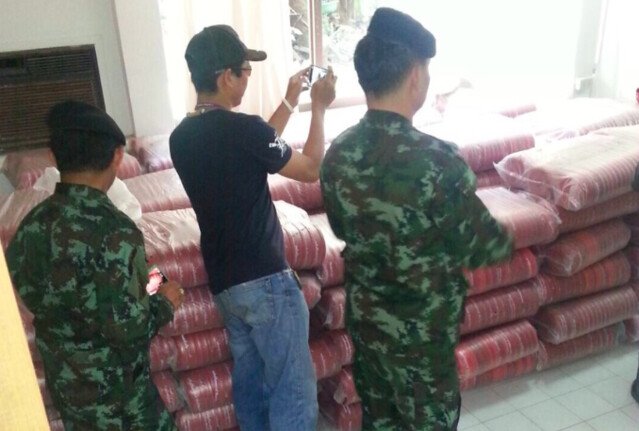
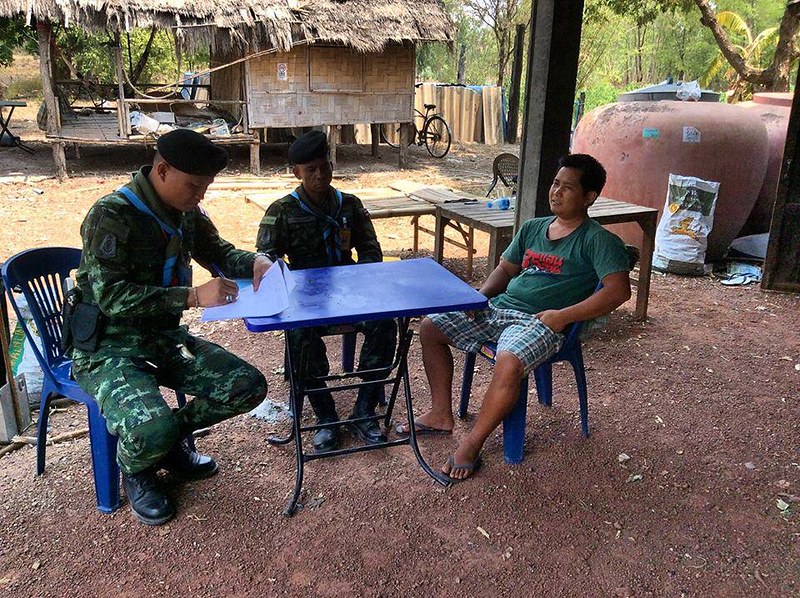
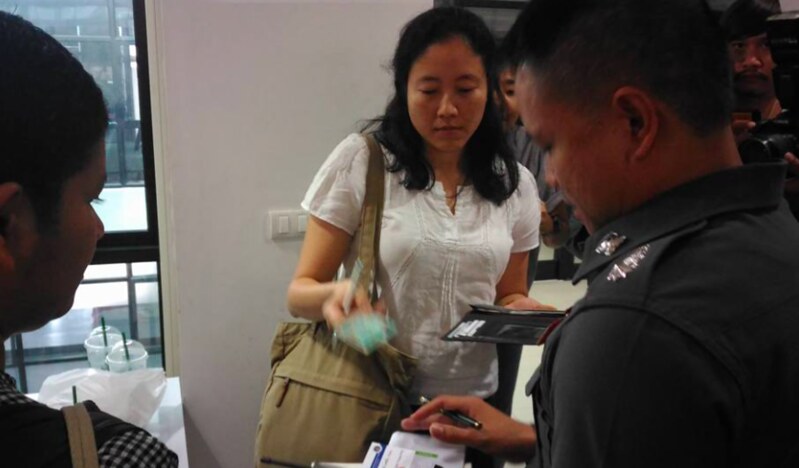
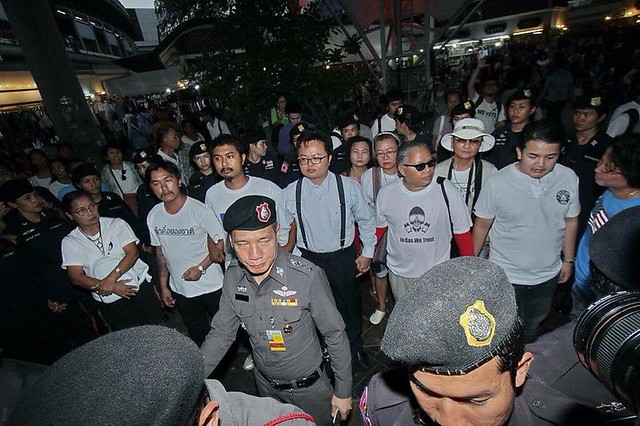






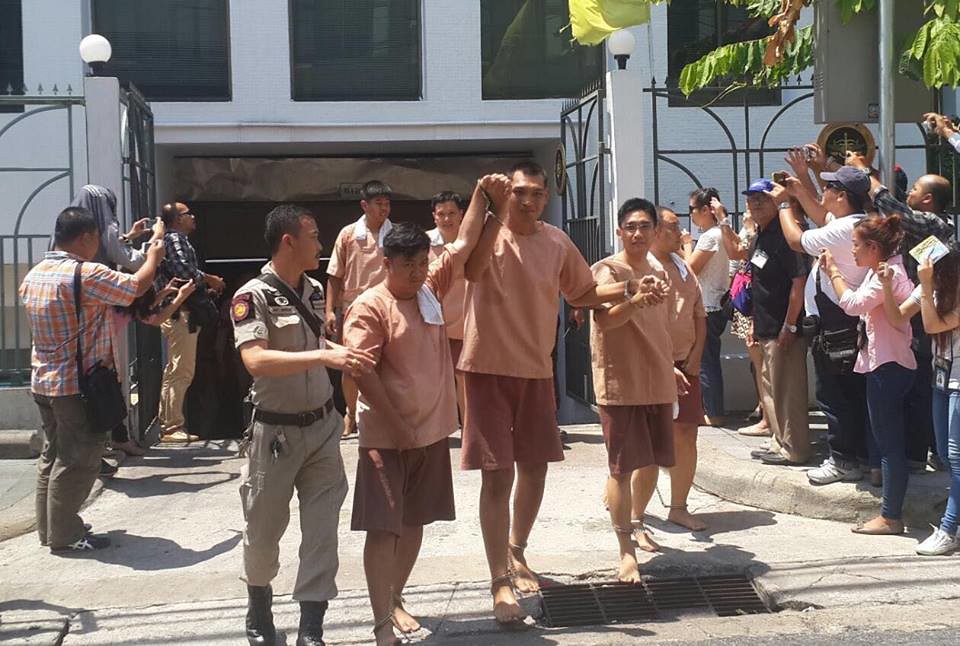

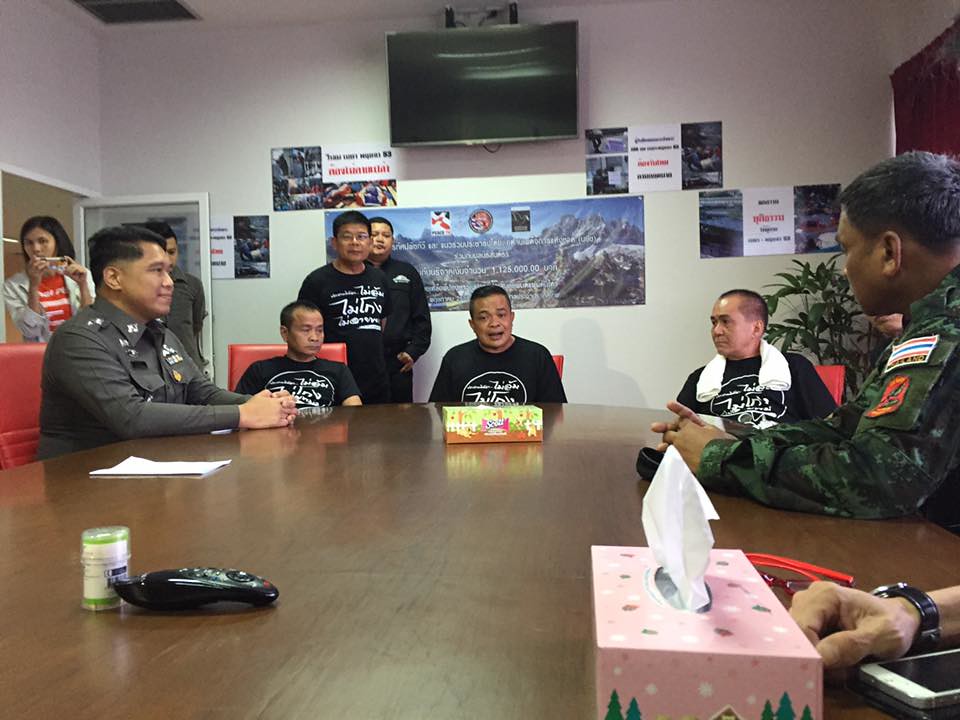








0 Comment to "Update : The climate of fear over the country ahead of the referendum on a new constitution"
Post a Comment